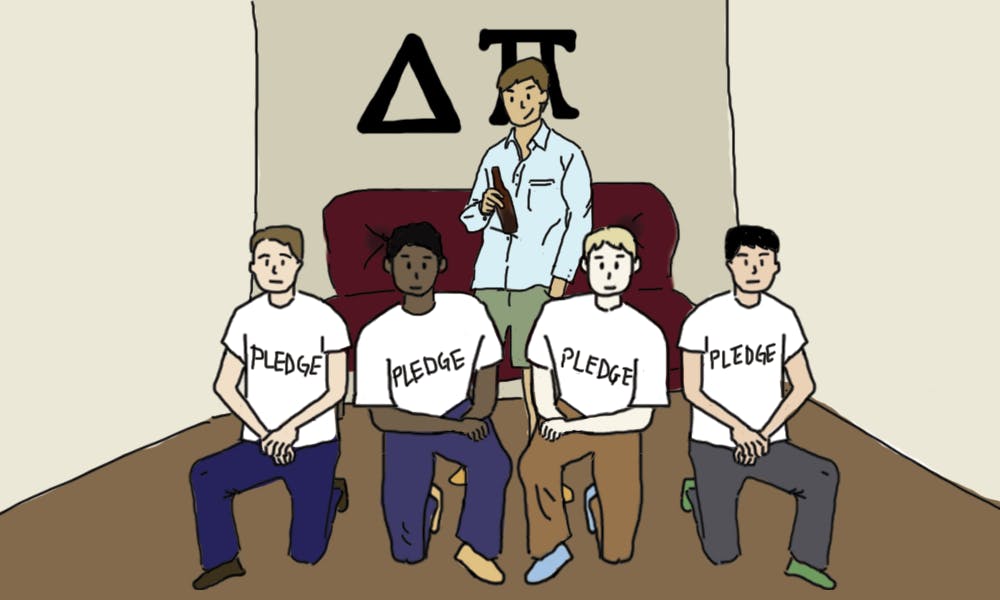
Fraternities have been institutionalized in American college life since the 1700s. These organizations promote values of community, support, and brotherhood. It is therefore ironic that their new member education processes can be entirely antithetical to these values.
The line between pledging and hazing is blurred.
Despite many fraternities’ cult-like efforts to keep pledging under wraps to avoid prosecution, most Penn students have heard accounts from pledges about sleepless nights, humiliating activities, and servant-type orders from pledge masters. The evidence is indisputable and widely known that many fraternities across the country haze as part of pledging. In fact, the national Zeta Beta Tau organization said it themselves: “Pledging always results in hazing.”
The University and the state have laws and regulations prohibiting hazing, which is defined as “any action or situation which recklessly or intentionally endangers the mental or physical health or safety of a student.”

To find out more about Penn’s stance on pledging, I sat down with President of the Interfraternity Council and College junior Reggie Murphy. On the subject of hazing, he insisted, “That’s against our policy, and it’s punishable.”
“The things that we’re doing to deter them … people could not listen to them at all,” Murphy said. “The numbers show that our chapters are not hazing, and if they are, it’s not being reported to us.”
While he denies that incidents of hazing at Penn occur, Murphy partly attributes this to underreporting and speculates that “maybe there’s a sort of taboo like you’re not supposed to talk about that and … people are less open to saying, ‘This is what happened to me.’”
But it is clear that university regulations do not always prevent the occurrence of hazing. Pennsylvania law did not prevent the death of Chun Hsien Deng, a Baruch College freshman who died while pledging Pi Delta Psi. Nor did it prevent the death of 19-year-old Pennsylvania State University student Tim Piazza, who was served 18 drinks in just over an hour. Nor did law prevent the death of an 18-year-old freshman at Louisiana State University after a fraternity hazing ritual. Nor did it prevent the deaths of two pledges at Texas State University and Florida State University.
Four fraternity-hazing-related deaths, in 2017 alone, led me to realize that the concepts of pledging and hazing are so historically intertwined that simply outlawing hazing is not enough. We must also stop clinging to the idea of pledging.
Stories of pledging activities are wide-ranging and innumerable, and evidence is not only anecdotal — it is not uncommon for pledging stories to make headlines. “Perform[ing] errands and favors for fraternity brothers,” menial labor, confinement, forced consumption of food and alcohol, sleep deprivation, and far more physically and mentally damaging situations are the norm in many pledge processes.
So common that we are numb to it, upperclassmen augment their own power by making pledges subservient to their demands. Even in a fraternity that takes anti-hazing seriously, the inherent power dynamic associated with pledging makes it all too easy for an upperclassman to say, “Pledge, pick this up. Move that. Clean those.”
Although Murphy emphasizes that pledges may say no to tasks without adverse effects, “I don’t think that you can ever ask people not to take advantage of, or try to take advantage of, the hierarchy,” he admits. “I don’t think we are at a point where older brothers are not asking pledges to do things.”
Murphy and the IFC also dispute the benefits of suffering. “You’re not gonna form a relationship with some guy that’s making you do something you don’t want to do.”
So what do proponents of pledging say?

The main argument in support of pledging, hazing included, is that mutual suffering and hardship create bonds and promote pledge class unity. Of course, people bond through suffering together. But does that mean we, as a society, should create artificial environments of brutality for the purpose of forging friendships?
No. Not only because it’s horrific and dangerous, but also because suffering is not the only way through which strong friendships develop. Under any other normal situation, our best friends are our brothers and sisters because we engage with them on a deep level. We certainly could lock ourselves in dog cages to strengthen our bond through our shared tears … but most best friends across the globe have — probably — not done that together.
Beyond Penn and the United States, is it really plausible that no one has experienced a fraternity-like community in countries and cultures where pledging is unheard of?
Fraternity bonds transcend pledge class, proving that friendships are created through spending time together, living in the same house, or planning events together — forced mutual suffering is not the sole, or most significant, prerequisite to friendship.
The intended purpose of pledging “is to educate new members about the organization they’re going to join,” Murphy explained. Given the abundance of evidence that pledges are frequently assigned tasks that do not align with this mission, pledging must be overhauled and replaced. It is fine to educate brothers on their organization, but we must instead employ a mechanism that is not prone to abuses of power.
ZBT believes that pledging creates second-class citizen status, and that “brothers need to earn their membership every day.” It was the first fraternity to abolish pledging nationally, with all new members initiated within 72 hours of receiving a bid.
It is true that all fraternities are different in the level of hazing they employ in their pledge processes. Fraternities that face hazing allegations often continue to operate by moving off campus, no longer facing the same disincentives from the IFC as the 27 registered chapters do. Regardless of jurisdiction though, pledging is conducive to demeaning, unnecessary, and dangerous tasks.
A large reason that we continue to defend pledging is the unquestioned pervasiveness in college culture. An undignified process perpetuated by blind tradition, it is taken for granted and justified because it occurs generation after generation.
Anti-hazing regulations are not followed. The root of the problem is society’s elevation of pledging’s position and this tradition’s accentuation of a dangerous power dynamic.
So, fraternity presidents, new member educators, and brothers, please realize that while you may think your intentions are innocuous, pledging can create a slippery slope for tasks that sway from your intended purpose.
It’s time that we respect those whose respect we warrant.

LUCY HU is a College sophomore from Auckland, New Zealand, studying political science. Her email address is lucyhu@sas.upenn.edu. “Fresh Take” usually appears every other Sunday.
CAMPUS RESOURCES
The HELP Line: 215-898-HELP
Counseling and Psychological Services: 215-898-7021 (active 24/7)
Student Health Service: 215-746-3535
Office of the Vice Provost for University Life: 215-898-6081
University Chaplain’s Office: 215-898-8456
Reach-A-Peer Helpline
- 215-573-2727 (every day from 9 p.m. to 1 a.m.)
- 215-515-7332 (texting service available 24/7)
Penn Benjamins (in-person peer counseling)
- Su, M, T 8-11 p.m. Harnwell Library First Floor
- W, Tr 8-11 p.m. Houston Hall Chaplains Office
The Daily Pennsylvanian is an independent, student-run newspaper. Please consider making a donation to support the coverage that shapes the University. Your generosity ensures a future of strong journalism at Penn.
Donate



